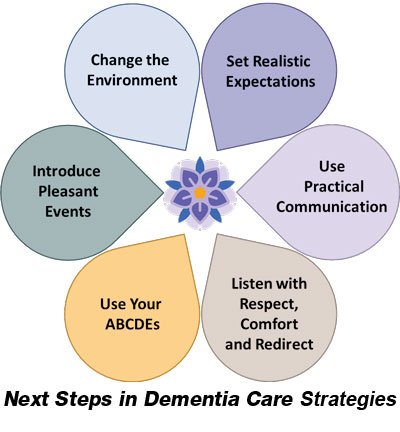Developing a Helpful Atmosphere With Professional Mental Deterioration Care
Producing an encouraging setting for people with mental deterioration requires a complex technique that integrates experienced care techniques customized to their distinct needs. The function of caregivers in this dynamic can not be overlooked, as their health is similarly crucial to supplying caring care.
Comprehending Dementia Requirements
When dealing with the complexities of dementia treatment, recognizing the distinct needs of people coping with this problem is vital - Memory Care Facilities Charlotte. Mental deterioration is a diverse cognitive condition that impacts memory, reasoning, and day-to-day functioning. For that reason, caregivers and healthcare specialists have to recognize that each individual's experience with dementia differs significantly, influenced by aspects such as the kind of mental deterioration, stage of the disease, and personal history.
Reliable mental deterioration treatment demands a person-centered method that values the person's values, choices, and routines. This consists of cultivating open interaction, which can help caregivers discern the certain needs and needs of those they sustain. In addition, understanding behavioral adjustments, such as anxiety or withdrawal, is crucial, as these actions often signal unmet requirements or discomfort.
In addition, caregivers need to be outfitted with expertise pertaining to the psychological and emotional elements of dementia. People might experience feelings of frustration, despair, or confusion, requiring compassionate actions that validate their experiences. By cultivating a setting of empathy and understanding, caretakers can improve the quality of life for individuals with mental deterioration, guaranteeing they really feel valued and sustained throughout their journey.
Designing Safe Spaces
Creating safe areas for people with mental deterioration is crucial, as a well-designed atmosphere can significantly boost their sense of safety and independence. The physical layout of an area ought to focus on security while advertising autonomy. This consists of lessening obstacles, making sure clear pathways, and making use of non-slip floor covering to decrease the threat of falls.
Incorporating comforting and familiar components, such as individual photos and treasured possessions, can help alleviate anxiety and produce a sense of belonging. In addition, utilizing suitable illumination is crucial; all-natural light is preferable, but soft, adjustable lighting can assist prevent complication and disorientation during various times of day.

Communication Techniques
Effective communication strategies are vital for fostering purposeful interactions with people living with dementia. Offered the cognitive difficulties related to this problem, caretakers need to employ approaches that enhance understanding and minimize frustration.
One important technique is to preserve eye get in touch with and make use of a calmness, mild tone of voice. This strategy aids to develop depend on and signals that the caretaker is totally involved. Additionally, making use of simple, clear language and avoiding complex sentences can promote better comprehension. It is also useful to ask yes-or-no questions, as these are less complicated for people with dementia to process and response.
Non-verbal communication plays a significant duty too; motions, face expressions, and touch can communicate empathy and connection. Caretakers need to be in harmony with the person's non-verbal hints to evaluate their emotion and adjust their approach appropriately.
Individuals with mental deterioration may require extra time to procedure details and formulate their thoughts. By executing these interaction techniques, caretakers can produce an encouraging atmosphere that enhances the well-being of people living with dementia.
Involving Tasks
Involving tasks play an important function in improving the top quality of life for people coping with dementia, complementing the communication methods previously gone over. These tasks not only give cognitive stimulation however also foster a sense of function and belonging. Tailoring activities to align with the person's preferences, abilities, and passions is important for optimizing interaction.
Innovative quests, such as art and songs treatment, can evoke emotions and memories, promoting connections with caregivers and peers. Straightforward jobs like gardening or cooking enable significant participation, urging freedom and self-confidence. In addition, physical tasks, including walking or gentle exercises, promote general wellness and can lower anxiety and anxiety.

Assistance Resources for Caregivers
Caring for a private with dementia can be an overwhelming experience, making accessibility to support resources important for caregivers' well-being. Various sources are available to help caretakers in managing the psychological and sensible difficulties related to mental deterioration treatment.
Regional assistance groups offer a vital platform for caregivers to share experiences, receive encouragement, and gain understandings from others dealing with comparable challenges. Several companies, such as the Alzheimer's Organization, provide academic programs and workshops that improve caregivers' abilities and understanding concerning dementia.
Additionally, reprieve treatment services can be indispensable, allowing caregivers to take required breaks without endangering the care offered to their liked ones. This type of support can protect against caregiver exhaustion, advertising overall mental and physical health and wellness.
On the Continued internet sources, including sites and forums devoted to mental deterioration treatment, offer caregivers the versatility of accessing info and area support at their ease. Additionally, mental health professionals specializing in caretaker support can provide customized counseling and coping methods.
Integrating these assistance resources into daily regimens guarantees that caregivers not just accomplish their duties properly yet also prioritize their own wellness, promoting a healthier caregiving environment.
Conclusion
In conclusion, developing a supportive setting for people with mental deterioration requires a multifaceted method that addresses their special requirements. Together, these components add to an alternative structure that promotes security, convenience, and psychological wellness for both people with mental deterioration and their caretakers.
Developing a supportive atmosphere for people with dementia requires a multifaceted approach that integrates experienced care methods customized to their unique requirements. Memory Care Facilities Charlotte. Caretakers and medical care specialists have to identify that each individual's experience with mental deterioration Find Out More differs significantly, affected by variables such as the kind of mental deterioration, stage of the condition, and personal history
By cultivating an environment of compassion and understanding, caregivers can boost the high quality of life for people with mental deterioration, guaranteeing they feel valued and sustained throughout their trip.
By executing these communication techniques, caregivers can develop a helpful environment her latest blog that boosts the wellness of individuals living with mental deterioration.
With each other, these components add to an all natural framework that promotes safety and security, comfort, and psychological health for both individuals with mental deterioration and their caregivers.